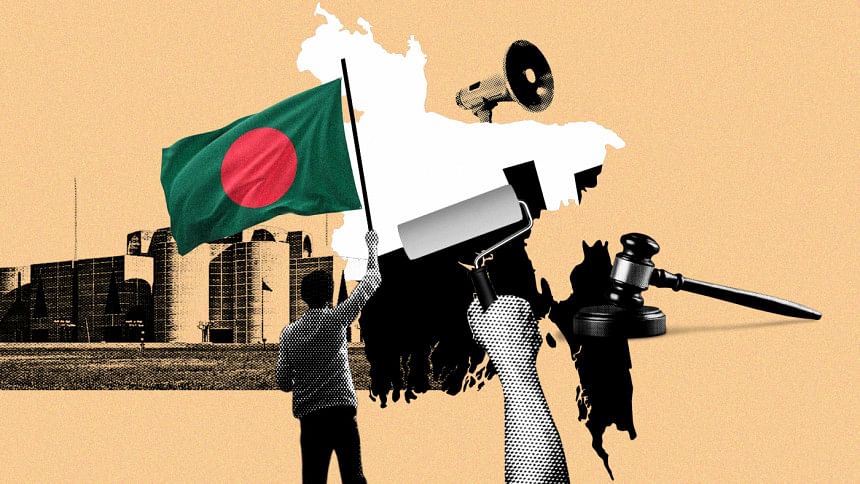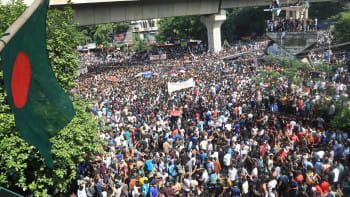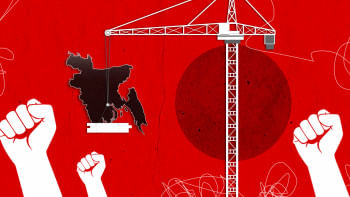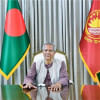Reflecting on one month of the interim government

It has been precisely one month since the interim government, led by Dr Muhammad Yunus, took office following a series of traumatic and dramatic events that tragically claimed more than 700 lives throughout July and August 2024. With its hopeful outlook and promises, the interim government has come to power to create an enabling framework for election for peaceful power transfer and sustainable economic growth that the nation's 170 million people aspire to see.
The student-led movement, a powerful force that has significantly reshaped the social ecosystem and public attitudes towards governance, politics, and security, has inspired hope and optimism. It has shifted the balance from elite and partisan entitlement to a more inclusive society. One must be mindful that all the grievances were and are still written on the wall.
People, particularly the youth, have put remarkable trust in the new government despite the past regime's infrastructural boom that widened disparity and encouraged the culture of kleptocracy. The anti-discrimination movement, led by the students under unforgettable gun-points and state-sponsored hostilities on the grounds, supported by the opposition parties, participated by the mass public and the remittance earners, and aided by the military, resulted from apolitical and rational demands reflecting the dire socio-economic crises.
So, what do we get from the agony of the past, hope of the present, and expectations for the future? The simple answer is "reform".
However, the interim government faces challenges on the path to reform due to the complexity of the political situation.
First, reform is a painful process and is often seen as unpopular when it begins with political institutions. In a rare historical situation, a civil government in Bangladesh took on its responsibilities when political institutions were almost non-existent and state institutions had been converted into partisan clubs. The existing political vacuum, hence, is more profound than one would expect.
Bangladesh Nationalist Party (BNP) is gradually reforming and rejuvenating itself, which will take some time. Jamaat-e-Islami is working to address the barriers imposed by the previous government. A political party to be set up by the students to sustain the movement's spirit is gradually gaining prominent space in public discourse, underscoring their continued influence on the new political landscape.
The debate about the nature of future elections—whether they should be inclusive and fair, or participatory and credible—will unfold in the coming days. The ultimate goal of the interim government should be to create an environment conducive to elections. At some point, whispering campaigns from the messiahs of textbook democracies or a neighboring country to hold an "inclusive election" will pop up, even though Awami League is tainted by an unforgivable past and crimes against humanity.
Ceteris paribus, a critical mass of the population, the students, or the two main political parties, BNP and Jamaat-e-Islami, will congruently exclude the AL and forge their own paths. Nonetheless, both parties have reaffirmed their public commitments to support reforms.
The necessary constitutional reform to ensure fair elections will be challenging due to varying public expectations and differing ideologies among political parties. Our political culture has not yet reached a point where the public can be confident that future governments will continue the constitutional reform efforts initiated by the interim government. The key focus here is to achieve political consensus on the ideological underpinnings of the parties. The left, right, far-right, and the left-right must agree on a state ideology reflecting the public aspirations. The sooner the national consensus is reached, the better the electoral and political reform prospects.
Secondly, reforming public institutions is equally necessary. Dr Yunus's cabinet has promptly initiated public sector reforms with the students' support. The focus should be on uprooting the kleptocratic structure. Given our past experiences, it would be wiser to have a limited agenda for reform rather than expanding extensively.
The interim government has logically not yet determined its life span for handing power over to an elected government. It has to be pragmatic about its course of deliverables to the public. The longer it stays at the helm of power, the greater the perils and crises it will embrace. Nonetheless, there is no alternative to radical but pragmatic thinking. It should now confine its reform agenda to the economy: banking, investment climate, energy, social safety network, education, and law enforcement.
The judiciary and the accountability institutions such as the commissions for elections, public service, university grants, and anti-corruption need fundamental but organic overhauling. Independent commissions for the police and media are essential to restoring public confidence in these two crucial pillars of society. Its breakneck speed in repairing these institutions has garnered public support.
However, the present government's success would lie in finding the right human resources to replace the subservient ones and, indeed, in how the advisers perform beyond their political prejudices. As we hear, the politics of grasping on to power have returned at the grassroots level, denoting a need for radical responses.
External and internal instigations will keep the security environment volatile, whether in the labour sector, communal harmony, the Chittagong Hill Tracts and the Myanmar front, or cyber domains. The key to the solution lies in coordination between the present government and the political parties. Mob rule, media trials, bulldozer justice, and social media disinformation and misinformation continue to dent public psychology.
It is imperative to urge students to resume classes and the public to return to regular life, enabling them to express their voices through rights, institutions, and political sanity. The interim government must not allow the glory of the precious student movement to be tarnished by fringe elements and toxic precedence.
If we want history to recognise the "anti-discrimination students' movement" as a revolution, we must be fully prepared to embrace radical and profound ideological and cultural shifts. But of course, as Audre Lorde said, revolution is not a one-time event.
Shahab Enam Khan is professor of international relations at Jahangirnagar University.
Views expressed in this article are the author's own.
Follow The Daily Star Opinion on Facebook for the latest opinions, commentaries and analyses by experts and professionals. To contribute your article or letter to The Daily Star Opinion, see our guidelines for submission.

 For all latest news, follow The Daily Star's Google News channel.
For all latest news, follow The Daily Star's Google News channel. 











Comments